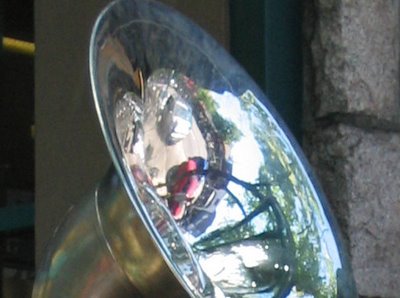Saturday, June 24, 2006
Updike in defense of the tangible book
Authors will, says Kelly, make money for their appearances, from workshops, and from interfacing directly with their readers. Updike points out that he rarely encountered one of his readers in the first 10 or 15 years after his work started being published. He also waxes eloquent on the joy of visiting bookstores, although not as eloquently as I could wax. Or perhaps, just as eloquently but in a different way.
The tactile experience of reading is not to be dismissed. Although I probably wouldn't have had the patience to slit the pages of a book two by two, I can certainly understand, given the weight and quality of the paper on which those books were printed and bound in their signatures, that for those a little less impatient than me, there was a ceremonial aspect to sitting at a lovely solid wood desk and carefully slicing along the folded edge with a utensil dedicated for this purpose. As one of my 18th and 19th Century lit profs said, in the days before television, reading was considered entertainment for the literate masses, and those who had the leisure to read at all were not daunted by the prospect of a long novel - they were, rather, delighted by the prospect of one that would occupy their leisure time for many days to come.
A real book is also portable, and while it's not difficult to imagine that technology will soon devise tiny perfect little optical readers that can be grabbed on the way out the door just like a book, they will NOT be just like books. Having worked in more than one bookstore on more than one occasion, I can tell you that for those who are passionate about reading, every shipment is like Christmas. In fact, the last time I worked in a bookstore I was forbidden to go anywhere near the shipments unless I was prepared to actually receive and shelve the books, since I'd fallen into the bad habit of opening all the totes, exclaiming with joy, and leaving a huge mess behind me. The design factor is not to be discounted in the book publishing industry - and frankly, web design has a long way to go before it can catch up with the sophistication of the book and magazine industries design capabilities (mainly because just about anyone can get some sort of web site up and going these days, regardless of their lack of comprehension of typography, graphic elements, and what constitutes good design, coupled with a blissful ignorance of its basic premise, The Golden Rule). I have seen books without even a title on their front covers fly off the shelves - there was a series of naughty books by a guy called John Colleton in the 70s that regularly disappeared in moments after being shelved based on their covers alone.
The prospect of reading even more megapixels isn't an appealing one. Even the experience of buying books online, convenient though it is, isn't as much fun as browsing in a bookstore. Nor am I anywhere near as likely to buy a book by an unknown author online, no matter how good its reviews. I certainly can't imagine buying a dozen or more books by authors unknown to me online. And yet I had no hesitation whatsoever to scoop up at least two dozen in the Virago women's writers series when they were on sale at David Mirvish Books in Toronto a decade or two ago. The covers, the chance to glance at the first paragraph, the fact that they were all on sale for less than half price - I was sold in no time. And I read every one of them too. The online book buying experience has really only one consolation for me - I have usually forgotten that I've placed an order by the time the books arrive, and thus conclude it's either my birthday or Christmas when they do magically appear. That's the point at which I get a little bit of the same excitement I get by fondling and poring over them in an actual store, accepting or rejecting them based on their covers, their first paragraphs, the back jacket blurb - and the amount of show-through in the paper on which they're printed. Buying online will also never give the joy of that spontaneous exchange of information called a conversation, either - the sort of conversation that often happens in the retail outlet when the person you're paying for the book has read it him- or herself - or the person in the line behind you spots it over your shoulder and tells you how much you're going to enjoy it. These conversations can take place wherever you go with your actual, real, live, fondle-able, tearable, write-in-able book, when someone sees you carrying it and you're suddenly embarked - often in the most unlikely places - on an oral ramble through the merits of the latest Peter Carey, My Life as a Fake, versus his earlier work, like Oscar and Lucinda or even - gasp - The Illywhacker.
It's a peculiar form of intellectual democracy when you feel you are constrained from speaking to someone because their ears are plugged with little headsets. What will happen when we can no longer make eye contact with our fellow public transit users because their eyes are also engaged in reading the text (downloaded from the internet and custom-selected by them) that's scrolling past (speed adjustable of course)?
"The printed, bound and paid-for book was — still is, for the moment — more exacting, more demanding [than information posted on the internet], of its producer and consumer both. It is the site of an encounter, in silence, of two minds, one following in the other's steps but invited to imagine, to argue, to concur on a level of reflection beyond that of personal encounter, with all its merely social conventions, its merciful padding of blather and mutual forgiveness. Book readers and writers are approaching the condition of holdouts, surly hermits who refuse to come out and play in the electronic sunshine of the post-Gutenberg village," says Updike. It's precisely because I want to read a book in the sunshine that I won't be giving up buying books anytime soon.
Things I wish I'd said

Reflected in the tuba's bell
Copyright Ruth Seeley
To use a camera as a means of artistic expression, a certain quality of spirit must be brought to aid light and air.
What is love? It is passion, admiration and respect. If you have two, you have enough. If you have all three, you don't have to die to go to heaven.
The truly fearless think of themselves as normal. Margaret Atwood
To wear your heart on your sleeve isn’t a very good plan; you should wear it inside, where it functions best. Margaret Thatcher
Never doubt that a small group of thoughtful, committed citizens can change the world. Indeed, it is the only thing that ever has. Margaret Mead
Truth isn’t always beauty, but the hunger for it is. Nadine
Trust is the key element in generating social capital. Paul Dickenson
[A] company’s brand image is made up of two things: What they do inside and how they communicate themselves outside. If these two become one it becomes a very strong brand. Jamie Anley, Jam Design
http://www.jamdesign.co.uk/
Monday, June 19, 2006
Commercial Drive Festival

I took almost 400 photos at the Commercial Drive Festival yesterday, an annual car-free event held in the city's east end. I was a little nervous about doing event photography, because crowds aren't my thing. I'd love to go to the big national exhibitions like the CNE and the PNE, because I love the rides. But I can't take the crowds, I start to feel quite panicky. I've always regretted not making it back to the fair in Goderich, Ontario, that had all the rides and none of the crowds. Cheap thrills.
Much to my surprise, despite an estimated crowd of 50,000 over the course of the day, the Commercial Drive Festival was a joy to attend. The photographic themes we were trying to capture were Father's Day, community, and what a car-free street looks like. Most of the photos I took were of the children's bike-decorating event, and it was lovely to see fathers and sons, fathers and daughters, working to get those bikes decorated in time for the parade behind the marching band that picked them up in the park and led them to the main street of the festival (Commercial Drive). Not one of the people I asked permission to photograph refused me (and I was very conscientious about asking). Of course, this meant there was a certain amount of posing going on, but I was also able to get some great candid shots. This little girl insisted that her fuzzy toy was going to be the one riding the bike. I guess it's her current favourite. And this is one of my favourites from the almost 400 shots. Five of my photos have been used on www.nowpublic.com already - must keep uploading, must keep uploading.




